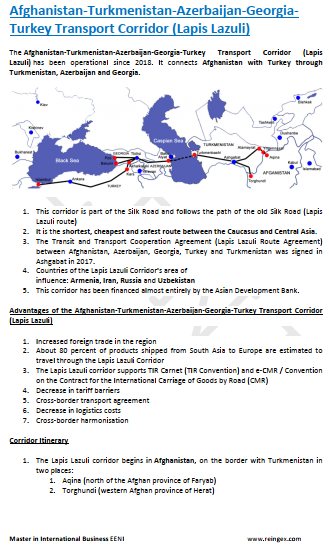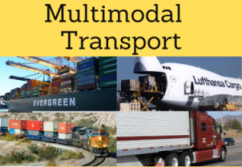Lapis Lazuli Transport Corridor, Turkey

Transport Corridor: Afghanistan Turkmenistan Azerbaijan Georgia Turkey (Lapis Lazuli)
- Introduction to the Afghanistan-Turkmenistan-Azerbaijan-Georgia-Turkey Transport Corridor (Lapis Lazuli)
- Main features of the Transport Corridor (Lapis Lazuli)
- Countries in the area of influence of the Lapis Lazuli Transport Corridor : Armenia, Iran, Russia, Uzbekistan
- The relationship of the Lapis Lazuli Transport Corridor with the
- The Lapis Lazuli Transport Corridor and the Silk Road of the 21st century

The Subject «Afghanistan-Turkmenistan-Azerbaijan-Georgia-Turkey Transport Corridor (Lapis Lazuli)» belongs to the following Online Programs taught by EENI Global Business School:
Transportation Courses: Road, Railway, Multimodal.

Diploma: International Transport.

Masters: International Transport, International Business.
Doctorates: Global Logistics, World Trade.
Languages:  .
Summary in
.
Summary in  Corredor Afganistán-Turquía (Lapislázuli)
Corredor Afganistán-Turquía (Lapislázuli)
 Corridor Afghanistan-Turkménistan-Azerbaïdjan-Géorgie-Turquie (Lapis-lazuli)
Corridor Afghanistan-Turkménistan-Azerbaïdjan-Géorgie-Turquie (Lapis-lazuli)  Corredor Afeganistão--Turquia (Lápis-lazúli).
Corredor Afeganistão--Turquia (Lápis-lazúli).
Masters for the Students from  Azerbaijan,
Azerbaijan,
 Turkey,
Turkey,
 Turkmenistan, and
Turkmenistan, and
 Georgia.
Georgia.
Sample - Afghanistan-Turkmenistan-Azerbaijan-Georgia-Turkey Transport Corridor (Lapis Lazuli)

Afghanistan-Turkmenistan-Azerbaijan-Georgia-Turkey Transport Corridor (Lapis Lazuli).
The Afghanistan-Turkmenistan-Azerbaijan-Georgia-Turkey Transport Corridor (Lapis Lazuli) has been operational since 2018. It connects Afghanistan with Turkey through Turkmenistan, Azerbaijan and Georgia.
- This corridor is part of the Silk Road and follows the path of the old Silk Road (Lapis Lazuli route)
- It is the shortest, cheapest and safest route between the Caucasus and Central Asia
- The Transit and Transport Cooperation Agreement (Lapis Lazuli Route Agreement) between Afghanistan, Azerbaijan, Georgia, Turkey and Turkmenistan was signed in Ashgabat in 2017
- Countries of the Lapis Lazuli Corridor's area of influence: Armenia, Iran, Russia and Uzbekistan
- This corridor has been financed almost entirely by the Asian Development Bank

Advantages of the Afghanistan-Turkmenistan-Azerbaijan-Georgia-Turkey Transport Corridor (Lapis Lazuli)
- Increased foreign trade in the region
- About 80 percent of products shipped from South Asia to Europe are estimated to travel through the Lapis Lazuli Corridor
- The Lapis Lazuli corridor supports TIR Carnet (TIR Convention) and e-CMR / Convention on the Contract for the International Carriage of Goods by Road (CMR, UN)
- Decrease in tariff barriers
- Cross-border transport agreement
- Decrease in logistics costs
- Cross-border harmonization
Corridor Itinerary
- The Lapis Lazuli corridor begins in Afghanistan, on the border with Turkmenistan in two places:
- Aqina (north of the Afghan province of Faryab)
- Torghundi (western Afghan province of Herat)
- The corridor crosses all of Turkmenistan (passing through Mary, Tejen, Yashlik, Ashgabat, Gokpede, Baharly, Serdar, Bereket, Kum Dag, Balkanabat) until reaching the port of Turkmenbashi (Turkmenistan) in the Caspian Sea
- The route between the port of Turkmenbashi (Turkmenistan) and the port of Baku (Capital of Azerbaijan) is done by sea
- From Baku the corridor reaches the Georgia-Azerbaijan border, passing through Shamakhi and Ganja
- From the border the corridor reaches the Georgian ports of Poti and Batumi passing through Tbilisi (Capital of Georgia)
- The corridor heads south until it reaches the Georgia-Turkey border
- From the border the corridor connects with the Turkish cities of Kars, Ankara, Mersin and Istanbul
The Afghanistan-Turkmenistan-Azerbaijan-Georgia-Turkey Transport Corridor (Lapis Lazuli) is part of the CAREC Transport Corridor
The Lapis Lazuli corridor will connect to the Turkey Middle Corridor Project ("Trans-Caspian East-West Trade and Transport Corridor").
Asian regional economic communities related to the Afghanistan-Turkmenistan-Azerbaijan-Georgia-Turkey Transport Corridor (Lapis Lazuli).
- Central Asia Cooperation (CAREC): Afghanistan, Azerbaijan, China, Kazakhstan, Kyrgyzstan, Mongolia, Pakistan, Tajikistan, Turkmenistan and Uzbekistan
- Economic Cooperation Organization (ECO): Afghanistan, Azerbaijan, Iran, Kazakhstan, Kyrgyzstan, Pakistan, Tajikistan, Turkey, Turkmenistan and Uzbekistan
- Commonwealth of Independent States: Armenia, Azerbaijan, Belarus, Kazakhstan, Kyrgyzstan, Moldova, Russia, Ukraine, Tajikistan, Turkmenistan and Uzbekistan
- Organization for Cooperation between Railways (OSJD): Azerbaijan, Albania, Afghanistan, Belarus, Bulgaria, Hungary, Vietnam, Georgia, Iran, Kazakhstan, China, North Korea, South Korea, Cuba, Kyrgyzstan, Latvia, Lithuania, Moldova, Mongolia, Poland, Russia, Romania, Slovakia, Tajikistan, Turkmenistan, Uzbekistan, Ukraine, Czech Republic and Estonia
- GUAM: Azerbaijan, Georgia, Moldova and Ukraine
- Black Sea Cooperation: Albania, Armenia, Azerbaijan, Bulgaria, Georgia, Greece, Moldova, Romania, Russia, Turkey and Belarus
- EU Eastern Partnership: Armenia, Azerbaijan, Belarus, Georgia, Moldova and Ukraine
- EU-South Caucasus Relations: Armenia, Azerbaijan and Georgia
- European Neighborhood Policy: Algeria, Armenia, Azerbaijan, Belarus, Egypt, Georgia, Israel, Jordan, Lebanon, Libya, Moldova, Morocco, the Occupied Palestinian Territory, Syria, Tunisia and Ukraine
- Black Sea Synergy: Armenia, Azerbaijan, Georgia, Moldova, Russia, Turkey and Ukraine
- Azerbaijan is a member of the Turkic Council
- Turkey is a member of:
- Euro-Mediterranean Partnership
- Customs Union with the EU
- Organization for Security and Cooperation in Europe (OSCE)
- Africa-Turkey Partnership
- Turkey is an observer country at the ACS
Related Trade Agreements
- Turkmenistan
- Trade Agreements with Armenia, Georgia and with the Eurasian Economic Union
- Azerbaijan
- Trade Agreements with Russia, Ukraine and Georgia
- Free Trade Agreement between Georgia, Ukraine, Azerbaijan and Moldova
- The EU Eastern Partnership
- Georgia
- EU-Georgia Agreement
- EFTA-Georgia Agreement
- Trade Agreements of Georgia with Turkey, Armenia, Azerbaijan, Russia, Ukraine, Kazakhstan, Turkmenistan, Uzbekistan
- Free Trade Agreement between Georgia, Ukraine, Azerbaijan and Moldova
- Turkey
- Turkish Trade Agreements: EFTA, Tunisia, Egypt, the EU, Chile, Africa-Turkey, Israel, Macedonia, Croatia, Bosnia and Herzegovina, Palestine, Syria, Jordan, Georgia and Albania
- Islamic Trade Preferential System (TPS-OIC)
- GSP
Main Euro-Asian institutions related to the corridor
- Boao Forum for Asia
- Asia Cooperation Dialogue
- ESCAP
- Asian Development Bank
- Colombo Plan
- UNECE
Major Islamic institutions related to the corridor
- OCI
- Islamic Development Bank
The main Religions of the region of the Afghanistan-Turkmenistan-Azerbaijan-Georgia-Turkey Transport Corridor (Lapis Lazuli) are:
The Afghanistan-Turkmenistan-Azerbaijan-Georgia-Turkey Transport Corridor (Lapis Lazuli) belongs to the:
Related Corridors to the Silk Road
- Bangladesh-Myanmar Corridor
- Asia-Africa Corridor
- China-Central-West Asia Corridor
- Almaty-Bishkek Corridor
- Europe-Caucasus-Asia Corridor
- China-Russia Corridor
- International North-South Corridor
- China-Pakistan Corridor
- Nanning-Singapore Corridor
- India-Afghanistan Corridor
- Kyrgyzstan-Iran Corridor
- Trans-Siberian Railway

(c) EENI Global Business School (1995-2024)
We do not use cookies
Top of this page



